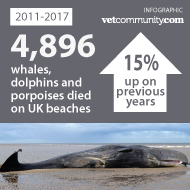Cetacean strandings on the rise in the UK

Infectious disease and incidental entanglement in fishing gear were among the most common causes of death.
Marine mammal strandings are on the rise in the UK, according to new figures, which reveal infectious disease and bycatch are among the most common causes.
A review by the UK government and the Zoological Society of London (ZSL) shows that 4,896 harbour porpoises, dolphins and whales were reported washed up on UK shorelines from 2011-2017.
This is an increase of 15 per cent compared to the previous seven-year period. Over 1,000 strandings were reported in 2017 alone, the highest number of stranding events in a single year since records began in 1990.
Cetologist and report lead Rob Deaville explained: “It’s difficult to say conclusively what’s driven this rise, but it’s potentially associated with multiple causes, including increases in local reporting effort and seasonal variation in the population density of some species.”
Researchers also carried out 1,030 post mortems during the report period. Infectious disease and incidental entanglement in fishing gear were among the most common causes of death. However, the likelihood of particular causes of death varied between species.
Other deaths caused directly by human activity included 25 animals killed by ship-strike and a single Cuvier’s beaked whale that suffered gastric impaction after ingesting marine litter in 2015.
However, Mr Deaville said the total proportion of deaths linked to human activity is likely to be much higher than the report shows. Whilst researchers can readily diagnose causes such as ship-strike, which causes characteristic injuries, less direct causes of death can be more difficult to identify.
“For example, cases of infectious disease may be associated with exposure to chemical pollution, including legacy pollutants such as PCBs (polychlorinated biphenyls), which can have immunosuppressive effects,” he added.
Whilst aspects of the report paint a “bleak picture”, Mr Deaville said there are still positives. Researchers recorded 21 cetacean species, including the dwarf sperm whale which had never previously been seen in the UK.



 The RCVS has announced a new version of its 1CPD mobile app, with enhanced features for veterinary surgeons and veterinary nurses to record their continuing professional development.
The RCVS has announced a new version of its 1CPD mobile app, with enhanced features for veterinary surgeons and veterinary nurses to record their continuing professional development.